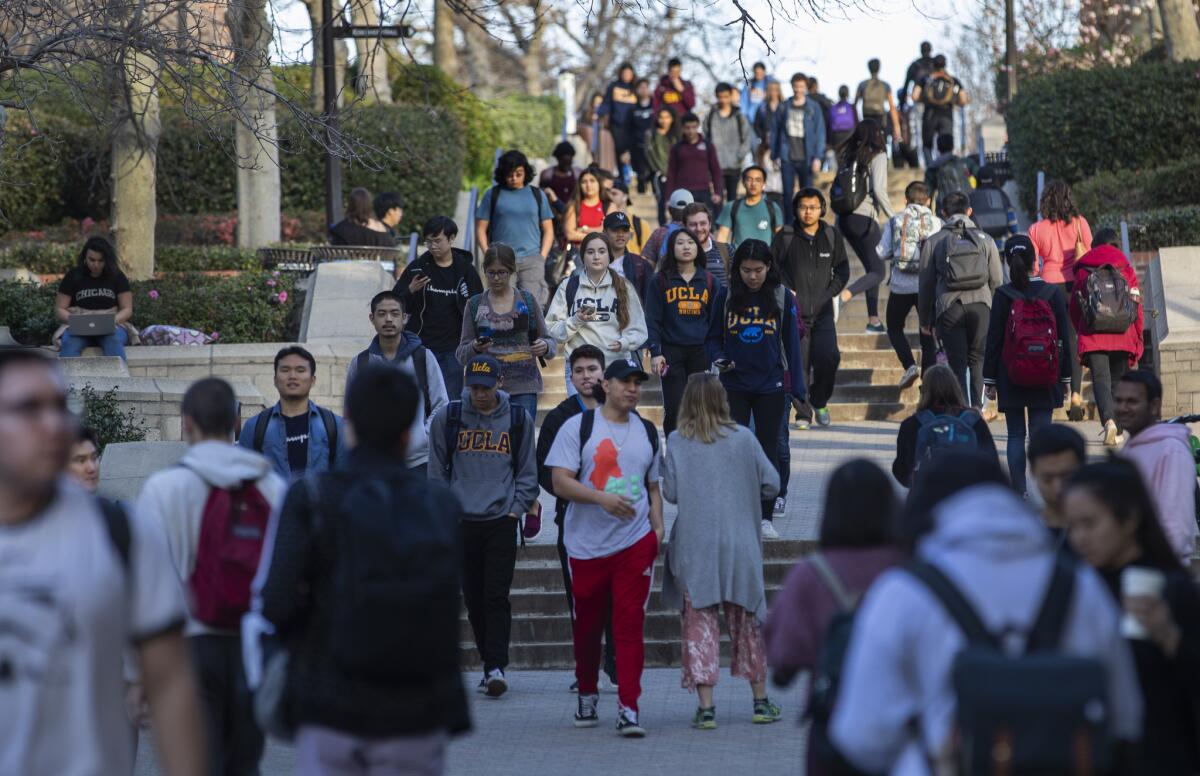Op-Ed: Why California needs affirmative action more than ever

In November, a new generation of California voters will have the opportunity to restore affirmative action in the state. Assembly Constitutional Amendment 5 will be on the ballot, giving voters the chance to repeal Proposition 209, which banned the consideration of race, sex or ethnicity in public employment, contracting and education in 1996, nearly a quarter of a century ago.
Supporters of affirmative action hail ACA 5 as a way to address historical and systematic racial, ethnic and gender inequalities, while opponents decry it as a form of categorical discrimination that privileges race and gender over merit. One contingent of opponents are politically conservative Asian immigrants, who claim that reinstating affirmative action will harm their children by placing an Asian quota on university admissions.
This view is wrong — the amendment will not result in racial quotas of any kind, which have been ruled unconstitutional since 1978. In fact, reversing Proposition 209 will help, not harm, Asian Americans.
First, Proposition 209 did not increase the rate of Asian American admissions to the University of California system. Instead, Asian Americans were admitted at nearly the same rate before and after the ban on affirmative action. The group that had the largest decline in admissions were white people, while Latinos had the largest gain. Asian American and African American admissions rates remained largely the same.
Second, by focusing solely on university admissions, Asian American opponents fail to consider how affirmative action in other domains, such as employment, is needed to break through blocked mobility and the career ceiling they face. College-educated, U.S.-born Asians fall behind their white counterparts in earnings, and also behind all groups in advancement beyond entry-level professional positions.
Recent reports of top technology firms in Silicon Valley show that Asians are the least likely racial group to be promoted into managerial and executive positions. White men and women are twice as likely as Asian men and women, respectively, to advance into the executive ranks.
A similar pattern emerges in law where Asians make up 10% of graduates of top-30 law schools, but only 6.5% of all federal judicial law clerks. And while they are the largest minority group in major law firms, Asian Americans have the highest attrition rates and lowest ratio of partners to associates.
Even in academia, where Asian Americans are overrepresented as students in elite universities, they are nearly absent in leadership ranks, making up only 2% of college presidents, far below the percentage of Black and Latino college presidents at 8% and 4%, respectively. Asians are not well represented among the ranks of tenured professors either. Take Harvard, for example, which is fighting a court case to keep affirmative action in place. The current freshman class is 25% Asian American, but among Harvard’s tenured professors, only 11% are Asian. And there is a stark gender divide: 8% are Asian men, and a mere 3% are Asian women. By far, the majority of Harvard’s tenured professors are white — 80%.
Third, the race-neutral policies are ineffective in addressing racial realities, as Asian Americans are finding as they confront the rise in anti-Asian hate since the outbreak of COVID-19. President Trump has stoked anti-Asian discrimination by calling it the “Chinese virus” and most recently “kung flu.” Nearly 1,900 cases of Asian harassment have been reported, ranging from verbal insults to beatings and stabbings.
Fortunately, the majority of Asian Americans recognize the continued significance of race. Nearly two-thirds of Asian American registered voters support affirmative action: 65% favored or strongly favored affirmative action, with only 25% opposed or strongly opposed.
Moreover, U.S.-born Asians, and especially third-and-higher-generation Asians (those whose parents and grandparents were born in the U.S.), are significantly more likely to support affirmative action than Asian immigrants, according to the 2016 National Asian American Survey. More recent immigrants may be less likely to understand the origins of affirmative action, and also less likely to experience the effects of systematic discrimination.
It’s crucial that this new generation of Asian Americans advocates for a more equitable opportunity structure that will help them and all marginalized populations, including in higher education, contracting and the workplace. Anti-affirmative action laws like Proposition 209 never “leveled the playing field,” but instead reinforced patterns of historic discrimination.
The majority of Asian Americans have shown time and again that they support affirmative action. They will need to prove their support in November at the ballot box.
Jennifer Lee is a professor of sociology at Columbia University and president of the Eastern Sociological Society.
More to Read
A cure for the common opinion
Get thought-provoking perspectives with our weekly newsletter.
You may occasionally receive promotional content from the Los Angeles Times.










